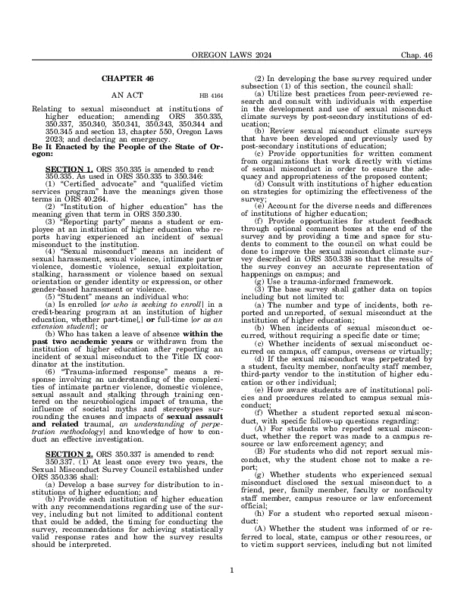ORS 350.337
Duties of council
- development of survey
- contents of survey
(1)
At least once every two years, the Sexual Misconduct Survey Council established under ORS 350.336 (Sexual Misconduct Survey Council established) shall:(a)
Develop a base survey for distribution to institutions of higher education; and(b)
Provide each institution of higher education with any recommendations regarding use of the survey, including but not limited to additional content that could be added, the timing for conducting the survey, recommendations for achieving statistically valid response rates and how the survey results should be interpreted.(2)
In developing the base survey required under subsection (1) of this section, the council shall:(a)
Utilize best practices from peer-reviewed research and consult with individuals with expertise in the development and use of sexual misconduct climate surveys by post-secondary institutions of education;(b)
Review sexual misconduct climate surveys that have been developed and previously used by post-secondary institutions of education;(c)
Provide opportunities for written comment from organizations that work directly with victims of sexual misconduct in order to ensure the adequacy and appropriateness of the proposed content;(d)
Consult with institutions of higher education on strategies for optimizing the effectiveness of the survey;(e)
Account for the diverse needs and differences of institutions of higher education;(f)
Provide opportunities for student feedback through optional comment boxes at the end of the survey and by providing a time and space for students to comment to the council on what could be done to improve the sexual misconduct climate survey described in ORS 350.338 (Survey of enrolled students) so that the results of the survey convey an accurate representation of happenings on campus; and(g)
Use a trauma-informed framework.(3)
The base survey shall gather data on topics including but not limited to:(a)
The number and type of incidents, both reported and unreported, of sexual misconduct at the institution of higher education;(b)
When incidents of sexual misconduct occurred, without requiring a specific date or time;(c)
Whether incidents of sexual misconduct occurred on campus, off campus, overseas or virtually;(d)
If the sexual misconduct was perpetrated by a student, faculty member, nonfaculty staff member, third-party vendor to the institution of higher education or other individual;(e)
How aware students are of institutional policies and procedures related to campus sexual misconduct;(f)
Whether a student reported sexual misconduct, with specific follow-up questions regarding:(A)
For students who reported sexual misconduct, whether the report was made to a campus resource or law enforcement agency; and(B)
For students who did not report sexual misconduct, why the student chose not to make a report;(g)
Whether students who experienced sexual misconduct disclosed the sexual misconduct to a friend, peer, family member, faculty or nonfaculty staff member, campus resource or law enforcement official;(h)
For a student who reported sexual misconduct:(A)
Whether the student was informed of or referred to local, state, campus or other resources, or to victim support services, including but not limited to appropriate medical care, mental health counseling and legal services; and(B)
Whether the student was provided with protection from retaliation, access to institution-based supportive measures or institution-based accommodations and criminal justice remedies;(i)
For a student who experienced assault, the types of contextual factors that were present during the assault, including but not limited to the involvement of force, incapacitation, coercion, drugs or alcohol;(j)
Demographic information that could be used to identify at-risk groups, including but not limited to sex, race, ethnicity, national origin, economic status, disability status, gender identity, immigration status and sexual orientation;(k)
Perceptions of campus safety among members of the campus community;(L)
Student confidence in the institution’s ability to protect against and respond to incidents of sexual misconduct;(m)
Whether students who reported sexual misconduct took a leave of absence from the institution, or considered transferring to another institution or withdrawing;(n)
Whether students who experienced sexual misconduct withdrew from any classes or were placed on academic probation;(o)
Whether students experienced any financial impacts from sexual misconduct or the institution’s response to a report of sexual misconduct;(p)
Whether students experienced any negative health impacts from sexual misconduct or the institution’s response to a report of sexual misconduct, including but not limited to post-traumatic stress disorder, anxiety, depression, chronic pain or eating disorders;(q)
Community attitudes towards sexual misconduct, including but not limited to students’ willingness to intervene as bystanders; and(r)
Any other questions the council determines would be beneficial.(4)
A base survey developed under this section:(a)
Shall:(A)
Include a “decline to state” and “not applicable” option for each question;(B)
Be offered to all students enrolled at the institution of higher education, including students who are on a leave of absence or studying abroad;(C)
Be created taking into account all reasonable measures to ensure that an adequate, random and representative sample of students complete the survey; and(D)
Be administered online, with reasonable accommodations provided to all students in order to ensure accessibility; and(b)
May not require the disclosure of any personally identifiable information. [2023 c.550 §3]
Source:
Section 350.337 — Duties of council; development of survey; contents of survey, https://www.oregonlegislature.gov/bills_laws/ors/ors350.html (accessed May 26, 2025).
